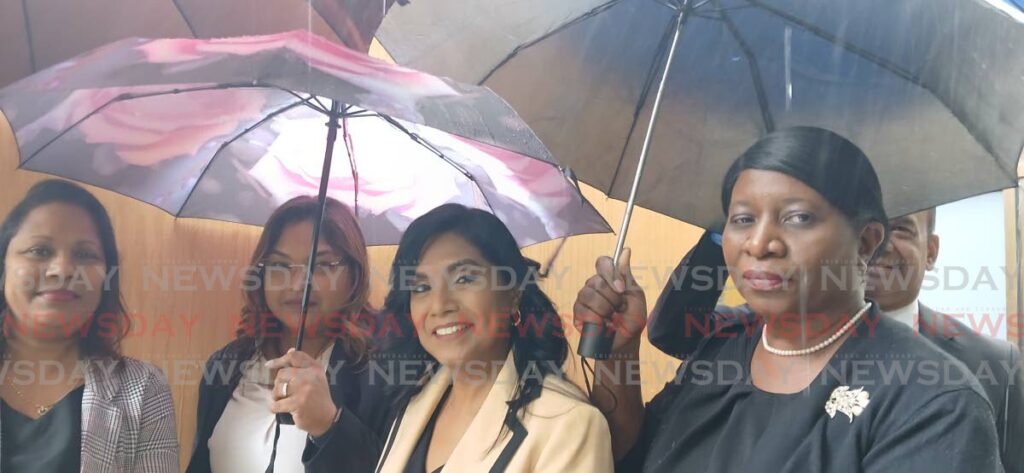Public Accounts Committee blanks Auditor General

JAIWANTIE RAMDASS, the Auditor General, had to wait for about 45 minutes in anticipation of a hearing of the Public Accounts Committee (PAC) to which she had been called, only for the hearing to be suddenly cancelled without explanation.
Parliamentary staff said the meeting was postponed but could not say until what date.
This happened on November 13 at Cabildo Chambers, Port of Spain. The sitting was due to start at 10.30 am, but by about 11.15 am parliamentary staff told reporters and Ramdass of the cancellation/postponement.
Ramdass was accompanied by other officials of the Auditor General's Office – Assistant Auditor General Shiva Sinanan, senior legal officer Anita Mangra, audit executive II Marcia Valley-Morris and audit executive I Brenda Ragbir-De Jean.
The hearing had been due to discuss the public accounts of Trinidad and Tobago for 2023 and a special report of the Auditor General on the public accounts for the financial year 2023. A press release from Parliament the day before listed those invited as the Auditor General’s Department.
On news of the cancellation, Ramdass consented to media requests for a photo, but opted not to comment on the cancellation/postponement.
PAC chairman Davendranath Tancoo, when contacted by Newsday, simply said, "I am unable to speak further on this. There was an in-camera (closed) discussion amongst the committee and a decision was taken. That is as much as I can say at this point."
The committee members are Tancoo, Adrian Leonce, Paula Gopee-Scoon, Dr Amery Browne, Ayanna Webster-Roy, Roger Monroe and Jearlean John.
Newsday was told Tancoo, Webster-Roy and John had been spotted at Cabildo Chambers, although the latter opted not to talk to reporters.
Gopee-Scoon later told Newsday she had been present. Via WhatsApp, she said the meeting had been postponed, not cancelled.
Asked why it was postponed, she echoed Tancoo, saying, "Discussions internal to the committee."
Newsday called Monroe's cellphone, which was answered by someone who said he was "in the field," which sounded consistent with flooding reported in Sangre Grande. Newsday tried but was unable to contact Leonce and Browne.
Owing to parliamentary staff having to also service the Public Accounts Enterprises Committee, Newsday was unable to find out the quorum of the seven-person committee, whose sitting at least four people had attended.
The Privy Council recently rejected Finance Minister Colm Imbert's bid to block Ramdass from a judicial review of Imbert's naming of a committee to probe her conduct within the wider remit of its investigation into an imbroglio in which he submitted the public accounts to her, but afterwards said they were incomplete.
Ministry officials belatedly asked Ramdass to consider fresh documents, and the government-dominated Parliament agreed to grant her an extension of time to consider these.
However, she then submitted a special report to Parliament, expressing dissatisfaction with the new documents, especially regarding the extra $2.6 billion in revenue shown by the Government in the public accounts.
The Constitution section 117 says the Auditor General is appointed by the President after consultation with the Prime Minister and the Leader of the Opposition.
Her duties and extensive powers are listed in almost three pages of legislation within the Exchequer and Audit Act (Act 20 of 1959, updated to 2016.)
Under section 9, the Auditor General's duties are to monitor the accounts of all accounting officers, receivers of revenue and officials handling public moneys or stamps, securities, stores or other State property. In this, the Auditor General shall satisfy himself that "all reasonable precautions have been taken to safeguard the collection of public moneys," with relevant laws, directions and instructions duly observed.
The Auditor General's powers are spelt out in section 10.
She may "call upon any officer for any explanations and information which the Auditor General may require in order to enable him to discharge his duties." Further the Auditor General may authorise any officer on her behalf to "conduct any inquiry, examination or audit."
The Auditor General is also empowered to take "custody of any books, accounts, vouchers or papers under the control of any officer relating to or in any wise concerning the public accounts, and to keep such books, accounts, vouchers or papers for such time as he may require them."

Comments
"Public Accounts Committee blanks Auditor General"